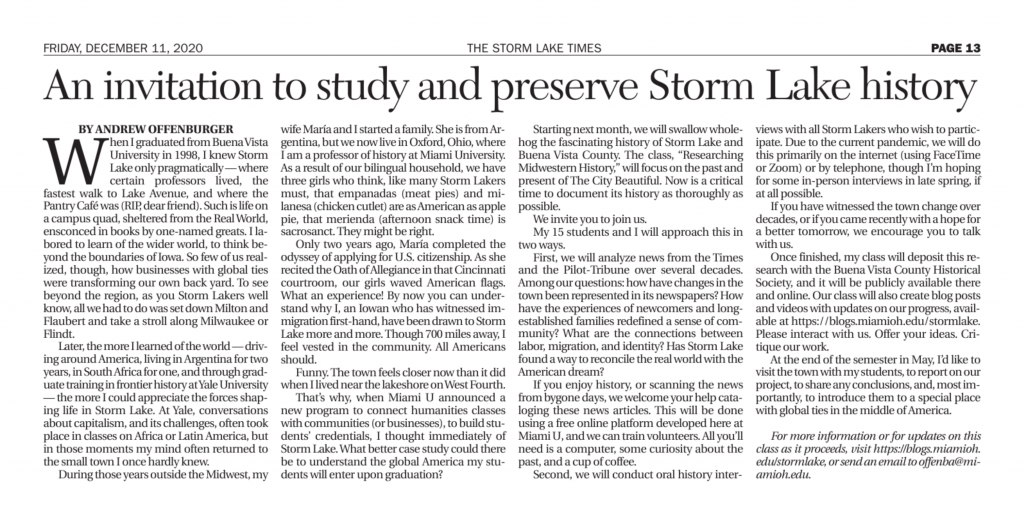
When I graduated from Buena Vista University in 1998, I knew Storm Lake only pragmatically – where certain professors lived, the fastest walk to Lake Avenue, and where the Pantry Café was (RIP, dear friend). Such is life on a campus quad, sheltered from the Real World, ensconced in books by one-named greats. I labored to learn of the wider world, to think beyond the boundaries of Iowa. So few of us realized, though, how businesses with global ties were transforming our own back yard. To see beyond the region, as you Storm Lakers well know, all we had to do was set down Milton and Flaubert and take a stroll along Milwaukee or Flindt.
Later, the more I learned of the world—driving around America, living in Argentina for two years, in South Africa for one, and through graduate training in frontier history at Yale University—the more I could appreciate the forces shaping life in Storm Lake. At Yale, conversations about capitalism, and its challenges, often took place in classes on Africa or Latin America, but in those moments my mind often returned to the small town I once hardly knew.
During those years outside the Midwest, my wife María and I started a family. She is from Argentina, but we now live in Oxford, Ohio, where I am a professor of history at Miami University. As a result of our bilingual household, we have three girls who think, like many Storm Lakers must, that empanadas (meat pies) and milanesa (chicken cutlet) are as American as apple pie, that merienda (afternoon snack time) is sacrosanct. They might be right.
Only two years ago, María completed the odyssey of applying for U.S. citizenship. As she recited the Oath of Allegiance in that Cincinnati courtroom, our girls waved American flags. What an experience! By now you can understand why I, an Iowan who has witnessed immigration first-hand, have been drawn to Storm Lake more and more. Though 700 miles away, I feel vested in the community. All Americans should.
Funny. The town feels closer now than it did when I lived near the lakeshore on West 4th.
That’s why, when Miami U announced a new program to connect humanities classes with communities (or businesses), to build students’ credentials, I thought immediately of Storm Lake. What better case study could there be to understand the global America my students will enter upon graduation?
Starting next month, we will swallow whole-hog the fascinating history of Storm Lake and Buena Vista County. The class, “Researching Midwestern History,” will focus on the past and present of the City Beautiful. Now is a critical time to document its history as thoroughly as possible.
We invite you to join us.
My 15 students and I will approach this in two ways.
First, we will analyze news from the Pilot-Tribune and the Times over several decades. Among our questions: how have changes in the town been represented in its newspapers? How have the experiences of newcomers and long-established families redefined a sense of community? What are the connections between labor, migration, and identity? Has Storm Lake found a way to reconcile the real world with the American dream?
If you enjoy history, or scanning the news from bygone days, we welcome your help cataloging these news articles. This will be done using a free online platform developed here at Miami U, and we can train volunteers. All you’ll need is a computer, some curiosity about the past, and a cup of coffee.
Second, we will conduct oral history interviews with all Storm Lakers who wish to participate. Due to the current pandemic, we will do this primarily on the internet (using FaceTime or Zoom) or by telephone, though I’m hoping for some in-person interviews in late spring, if at all possible.
If you have witnessed the town change over decades, or if you came recently with a hope for a better tomorrow, we encourage you to talk with us.
Once finished, my class will deposit this research with the Buena Vista County Historical Society, and it will be publicly available there and online. Our class will also create blog posts and videos with updates on our progress, available at https://sites.miamioh.edu/stormlake. Please interact with us. Offer your ideas. Critique our work.
At the end of the semester in May, I’d like to visit the town with my students, to report on our project, to share any conclusions, and, most importantly, to introduce them to a special place with global ties in the middle of America.

